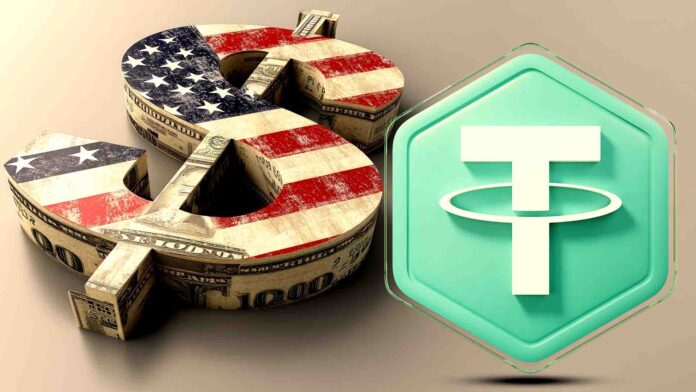Key Insights:
- New York Attorney General Letitia James urged Congress to regulate stablecoins issued by foreign companies like Tether.
- She emphasized the need for stablecoins to be backed one-to-one by U.S. dollars or treasuries and held in U.S.-regulated banks.
- James warned that Tether’s extensive holdings in U.S. treasuries could pose risks to financial markets during high redemptions.
New York Attorney General Letitia James has urged Congress to tighten control over foreign-issued stablecoins like Tether.
She cautioned that allowing unregulated foreign issuers could harm U.S. economic stability and weaken the dollar’s global position.
Her letter comes amid growing concerns about digital assets and their potential impact on traditional financial systems.
Tether’s Structure Sparks Dollar Dominance Concerns
Letitia James highlighted that Tether operates without direct U.S. facilities, making it challenging for regulators to oversee the stablecoin provider.
Bitcoin and precious metals are among the assets backing Tether’s USDT token, while the dollar equivalents typically used for backing are not exclusive.
The combination of assets creates instability for market participants throughout volatile periods until the rapid redemption period ends.
James emphasized that widespread, fast withdrawals of stablecoins in overstressed markets would adversely affect the treasury market.
She demonstrated how Tether’s mass selling of U.S. Treasury bills might significantly impair American debt markets.
The risk grows substantially because Tether maintains $94.5 Billion in U.S. treasuries.
According to James, when Tether makes hasty withdrawals from its treasury holdings, it could harm the liquidity of the U.S. financial framework.
Tether established its headquarters in El Salvador to relocate from U.S. jurisdiction.
By moving its headquarters to El Salvador, Tether increased worries regarding its accountability mechanisms and operational transparency.
AG Calls For Onshoring and Regulation of Stablecoins
AG James called on lawmakers to mandate that all stablecoins circulating in the U.S. be backed one-to-one by dollars or treasuries.
As per Letitia James, issuers establish operations out of U.S. locations while being fully regulated under state and federal oversight.
According to her correspondence, reserves must be kept safe at banks operating under U.S. regulatory authority to prevent international control.
The document argued that foreign stablecoins presented critical system-wide dangers; therefore, Congress should handle them in current stablecoin legislation.
Information controls must exist to sustain trust in U.S. dollars and financial institutions operating domestically.
Tether’s structure stands apart from these guidelines mainly because its diverse reserve composition lacks complete U.S. legal transparency.
Like previous investigations, the New York regulators accused Tether of presenting false information regarding its reserve assets in 2021.
According to James, the protection of financial stability requires Congress to fill gaps in digital asset regulation while developing the new legislation.
Circle’s Compliance Sets an Industry Example
USDC’s issuer, Circle, performs its operations under U.S. regulatory authorities while keeping the majority of its funds in dollar holdings and treasury bills.
Circle’s operational structure best fits James’s model by establishing itself as a safer dollar-backed digital asset choice.
The company maintains its U.S. presence to guarantee compliance with federal financial regulations and accountability.
Circle’s domestic oversight and public financial reporting process create steady public trust in its reserve system.
According to Circle’s operational model, stablecoins can function properly within the laws of the United States.
Circle’s approach to regulation functions as a blueprint for upcoming stablecoin solution providers who aim to establish long-term market reliability.
When discussing Circle’s model, James creates distinction through her examination of Tether’s foreign operations.
The approach taken by Circle supports policymakers’ view of it as a responsible innovation that aligns with national financial interests.
Unregulated Crypto Poses National Security Risks
James notified Congress about an impending danger that Bitcoin and similar cryptocurrencies presented to the supremacy of the U.S. dollar.
In her letter to Congress, she explained how Bitcoin allows value transfers without bank involvement, thus posing a threat to established financial infrastructure.
Unregulated changes like this one may affect U.S. economic power.
When combined with foreign stablecoins, Bitcoin’s decentralized system and unregulated manner create security issues regarding the nation’s defense establishment.
James explained that the dollar’s dominant status enables people worldwide to depend on American institutions.
The absence of regulatory oversight for digital currencies threatens trust between people and financial institutions, the AG noted.
According to James, she advised politicians to handle digital assets with care through established guidelines aimed at safeguarding U.S. economic stability.
In her view, the dollar’s status as the worldwide monetary priority remains essential for lasting fiscal protection.
Treasury Plans Review of Crypto Regulations
Treasury Secretary Scott Bessent announced a renewed effort to review blockchain and stablecoin regulations to encourage innovation while ensuring safety.
According to Bessent’s statements, the government is working to remove technical obstacles that do not impact economic stability.
The review regimen fundamentally safeguards consumer rights and, therefore, protects the nation’s essential financial obligations.
Congress must choose between supporting new technological growth or preserving established economic institutions as its next decisive act.
A balanced regulatory system enables both national goals to succeed independently of key national priorities.
